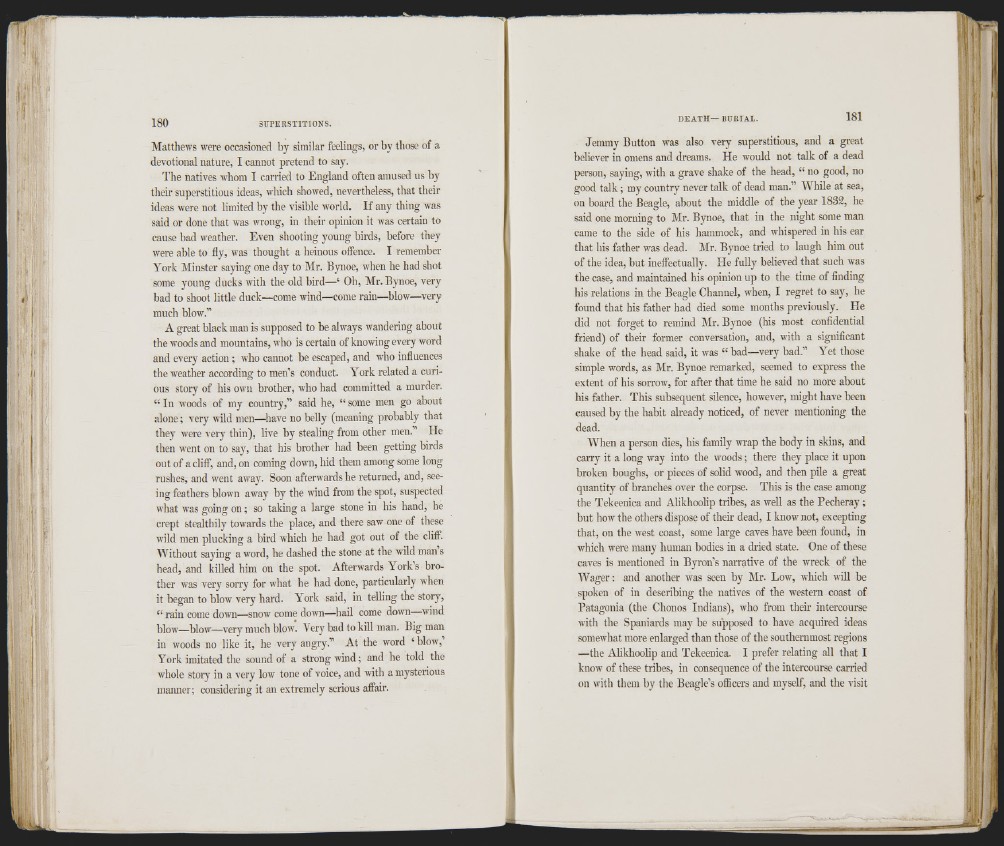
7.
r
" ' .1
I
II
I i :
Matthews were occasioned by similar feelings, or by those of a
devotional nature, I cannot pretend to say.
T h e natives whom I carried to E n g lan d often amused us by
their superstitious ideas, which showed, nevertheless, th a t their
ideas were not limited by the visible world. I f any thing was
said or done that was wrong, in their opinion it was certain to
cause bad weather. E v en shooting young birds, before they
were able to fly, was th o u g h t a heinous ofience. I remember
Y o rk Minster saying one day to Mr. Bynoe, when he had shot
some young ducks with the old bird— ‘ Oh, Mr. Bynoe, very
bad to shoot little duck—come wind—come rain—blow—very
much blow.”
A great black man is supposed to be always wandering about
the woods and mountains, who is certain of knowing every word
and every action ; who cannot he escaped, and who influences
th e weather according to men’s conduct. Y o rk related a curious
story of his own brother, who had committed a murder.
“ I n woods of my country,” said he, “ some men go about
alone; very wild men—have no belly (meaning probably th a t
they were very th in ), live by stealing from other men.” H e
then went on to say, th a t his brother had been getting birds
out of a cliflp, and, on coming down, hid them among some long
rushes, and went away. Soon afterwards he returned, and, seeing
feathers blown away by the wind from th e spot, suspected
what was going o n ; so taking a large stone in his hand, he
crept stealthily towards the place, and there saw one of tliese
wild men plucking a bird which he h ad got ou t of the cliff.
W ith o u t saying a word, he dashed the stone a t th e wild m an s
head, and killed him on the spot. Afterwards Y o rk ’s broth
e r was very sorry for what he had done, particulaily when
it began to blow very hard . Y o rk said, in telling the story,
“ rain come down—snow come down—hail come down—wind
blow—blow—very much blow. Very bad to kill man. Big man
in woods no like it, he very angry.” A t the word ‘ blow,’
York imitated tlie sound o f a strong wind; and he told the
whole story in a very low tone of voice, and with a mysterious
manner; considering it an extremely serious affair.
il
Jemmy Button was also very superstitious, and a great
believer in omens and dreams. H e would not ta lk of a dead
person, saying, with a grave shake o f the head, “ no good, no
good talk ; my country never talk of dead man.” W h ile a t sea,
on board the Beagle, about the middle of the year 1832, he
said one morning to Mr. Bynoe, th a t in the n ig h t some man
came to the side of his hammock, and whispered in his ear
th a t his father was dead. IMr. Bynoe tried to lau g h him ou t
o f the idea, b u t ineffectually. H e fully believed th a t such was
th e case, and maintained his opinion u p to the time of finding
his relations in the Beagle Channel, when, I regret to say, he
found th a t his father had died some months previously. H e
did not forget to remind Mr. Bynoe (his most confidential
friend) of their former conversation, and, with a significant
shake of the head said, it was “ bad—very had.” Y e t those
simple words, as Mr. Bynoe remarked, seemed to express the
extent o f his sorrow, for after th a t time he said no more ahout
his father. T h is subsequent silence, however, might have been
caused by th e hab it already noticed, o f never mentioning the
dead.
W h e n a person dies, his family wrap the body in skins, and
carry it a long way into the woods; there they place it upon
broken boughs, or pieces of solid wood, and then pile a great
quantity o f branches over the corpse. T lu s is the case among
the Tekeenica and Alikhoolip tribes, as well as th e Pecheray ;
b u t how the others dispose of their dead, I know not, excepting
th a t, on the west coast, some large caves have been found, in
which were many human bodies in a dried state. One o f these
caves is mentioned in Byron’s narrative of the wreck o f the
W a g e r : and another was seen b y Mr. Low, which will be
spoken of in describing the natives of the western coast of
Patagonia (the Chonos Indians), who from their intercourse
with the Spaniards may be supposed to have acquired ideas
somewhat more enlarged than those of the southernmost regions
—the Alikhoohp and Tekeenica. I prefer relating all th a t I
know of these tribes, in consequence of the intercourse carried
on with them by the Beagle’s officers and myself, and the visit
M; 15 ■
If